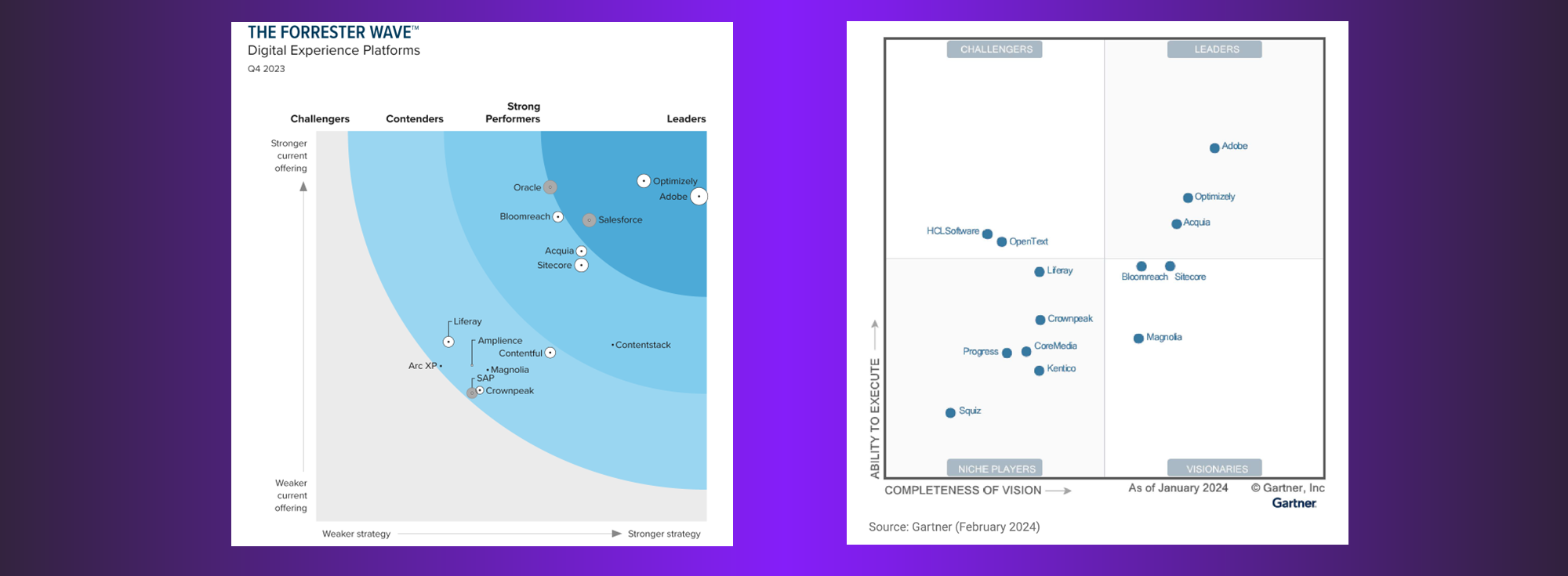Why businesses are making the switch from Sitecore to Optimizely DXP: A comprehensive analysis
In the ever-evolving landscape of digital experience platforms (DXPs), businesses are constantly reevaluating their tech stacks to ensure they're getting the best value and performance. Recently, there's been a noticeable trend of companies migrating from Sitecore to Optimizely DXP. This shift isn't just a random occurrence—it's backed by compelling reasons that address both technical and business needs. In this post, we'll dive deep into why this migration is happening and what it means for both marketing professionals and IT decision-makers.
The changing DXP landscape
Before we delve into the specifics, it's important to understand the current state of the DXP market. Recent analyst reports, including the Forrester Wave for DXP and the Gartner Magic Quadrant for DXP, have shown a clear trend: Optimizely's star is rising, while Sitecore's position has been declining.
In fact, the latest Forrester Wave report revealed that Optimizely scored higher than any other featured vendor for current offering, second only to Adobe in terms of strategy. Similarly, Gartner recognized Optimizely for its simple and scalable pricing and packaging, its integrated product suite, and its ability to unify data across many of its capabilities.

These accolades aren't just fancy badges—they reflect real-world performance and customer satisfaction. But what's driving this shift? Let's break it down.
Key factors driving the migration
- Simplicity and ease of use: One of the most common frustrations voiced by Sitecore users is the platform's complexity. While Sitecore is undoubtedly powerful, it often requires a significant investment in development resources.
Consider this feedback from a 40,000-member association: "I've used it [Sitecore] in the past frequently, and again, good system, but very developer-heavy. It's not meant for a company that has a smaller dev side and also the interface is not content editor friendly."
Optimizely, on the other hand, has focused on creating a more user-friendly interface that empowers marketing teams. This means less reliance on developers for day-to-day tasks, faster time-to-market for new content and campaigns, and ultimately, a more agile digital presence. - Cost-effectiveness: The total cost of ownership (TCO) is a crucial factor for any business decision, and DXPs are no exception. Several organizations have cited Sitecore's high costs as a reason for looking elsewhere.
A healthcare automation and medication management company described Sitecore's pricing as "astronomical," noting that it required 6 or 7 developers on staff. Similarly, the largest manufacturer of exterior building products in the USA found Sitecore to be "the most expensive of all solutions."
Optimizely has positioned itself as a more cost-effective alternative, offering competitive pricing without sacrificing functionality. This is particularly appealing for mid-sized businesses or those looking to optimize their IT budgets. - Scalability and performance: As businesses grow, their DXP needs to grow with them. Scalability has been a pain point for some Sitecore users, particularly when it comes to handling high-traffic scenarios or complex multi-site setups.
Optimizely's cloud-native architecture provides better scalability out of the box, allowing businesses to handle traffic spikes and grow their digital presence without worrying about infrastructure limitations. - Integration and data unification: In today's data-driven marketing landscape, the ability to integrate various tools and unify data across platforms is crucial. Gartner specifically praised Optimizely for its ability to "unify data across many of its capabilities."
This integration capability means marketers can get a more holistic view of their customers, while IT teams spend less time managing complex integrations between disparate systems. - Innovation and future-proofing: To stay competitive, businesses need a DXP that's not just solving today's problems, but is also innovating for the future. Some Sitecore users have expressed concerns about the platform's future direction.
For instance, the release notes for Sitecore 10.4 showed only 50 'new features/improvements', many of which added little business value or failed to improve usability, increase engagement, or provide better content insights.
In contrast, Optimizely has been consistently innovating, particularly in areas like AI-driven personalization, experimentation, and content optimization. This focus on innovation helps businesses stay ahead of the curve and continuously improve their digital experiences. - Support and community: The level of support and the vibrancy of the developer community can significantly impact the success of a DXP implementation. While Sitecore has a established community, some users have reported challenges with support responsiveness.
Optimizely has been investing heavily in its support infrastructure and developer community, offering comprehensive documentation, active forums, and responsive customer support. - Flexibility and customisation: While both platforms offer customization options, Optimizely has gained a reputation for being more flexible and adaptable to unique business needs. This is particularly important for organizations with specific industry requirements or unique digital experience strategies.
- Upgrade path and long-term strategy: For many businesses, particularly those in regulated industries like financial services, using technology that's under mainstream support is crucial. Sitecore's shift towards their new XM Cloud solution has left some customers concerned about the future of their current implementations.
An upgrade to Sitecore's new cloud offering often requires a complex and expensive rebuild, which has prompted many customers to evaluate their options. Optimizely, with its more straightforward upgrade paths and clear product roadmap, offers a more stable long-term strategy for many organizations. - Content management and marketing features: While Sitecore has traditionally been strong in content management, Optimizely has made significant strides in this area while also excelling in marketing-specific features like A/B testing, personalization, and campaign management.
For marketing professionals, this means a more comprehensive toolkit for creating, optimizing, and measuring digital experiences. IT decision-makers benefit from having a single platform that meets a wide range of needs, reducing the need for multiple point solutions. - Cloud strategy: As more businesses move towards cloud-first strategies, the cloud capabilities of a DXP become increasingly important. Optimizely's cloud-native approach aligns well with modern IT strategies, offering benefits like automatic updates, improved security, and easier scaling.
While Sitecore is moving in this direction with XM Cloud, the transition has been challenging for some existing customers, whereas Optimizely users are already benefiting from a mature cloud offering.
Making the switch: practical considerations
If you're considering making the switch from Sitecore to Optimizely, it's not a decision to be taken lightly. Here are some practical steps to consider:
- Assessment: Conduct a thorough assessment of your current Sitecore implementation, identifying pain points and areas for improvement.
- Requirements gathering: Clearly define your business requirements, involving both marketing and IT stakeholders.
- Proof of concept: Consider running a proof of concept with Optimizely to see how it addresses your specific needs.
- Migration planning: Develop a comprehensive migration plan, including content migration, integrations, and training.
- Phased approach: Consider a phased migration approach to minimize disruption and manage risks.
To assist with the migration process, Optimizely has developed resources like the Sitecore to Optimizely Framework, available on GitHub. This framework can help streamline the migration process and reduce implementation time.
Conclusion
The shift from Sitecore to Optimizely DXP is more than just a trend—it's a reflection of changing business needs and technological advancements in the DXP space. For marketing professionals, Optimizely offers a more user-friendly platform with powerful tools for personalization, testing, and optimization. For IT decision-makers, it presents a more cost-effective, scalable, and future-proof solution.
However, every organization's needs are unique, and what works for one may not work for another. The key is to carefully evaluate your specific requirements, consider both short-term and long-term implications, and choose the platform that best aligns with your digital strategy and business goals.
As the digital landscape continues to evolve, staying agile and open to new solutions will be crucial for businesses looking to deliver exceptional digital experiences. Whether you're currently using Sitecore, Optimizely, or another DXP, regular reassessment of your technology stack is a valuable exercise to ensure you're well-positioned for future success.
Ready to explore your DXP options?
At 26 DX, we understand that navigating the complex world of Digital Experience Platforms can be challenging. That's why we're offering a complimentary 30-minute tele-evaluation of your current digital challenges. Our experts will assess your situation and determine if Optimizely DXP, implemented with 26 DX's expertise, could be the solution you're looking for.
During this no-obligation consultation, we'll:
- Listen to your current pain points with your existing DXP
- Discuss your digital experience goals
- Provide initial insights on how Optimizely could address your challenges
- Outline potential next steps if Optimizely seems like a good fit
Contact 26 DX today quoting "DXP evaluation" to schedule your free 30-minute tele-evaluation. Let's work together to unlock your digital potential with Optimizely DXP.
Our insights
Tap into our latest thinking to discover the newest trends, innovations, and opinions direct from our team.
